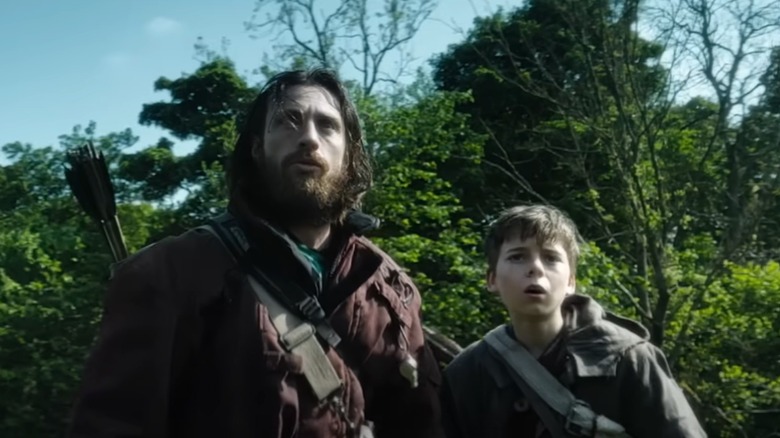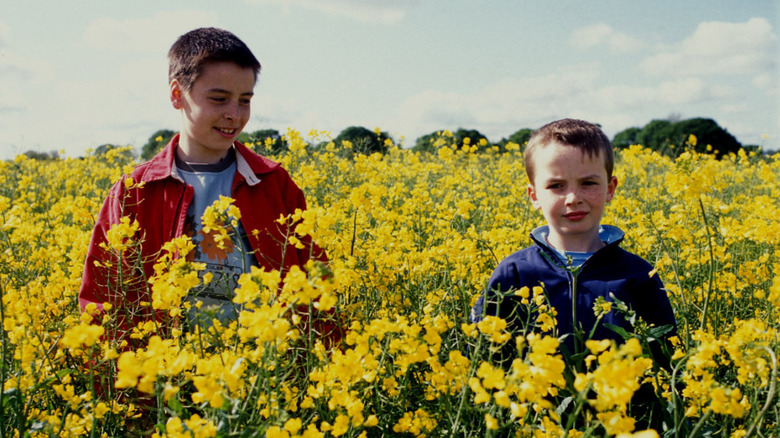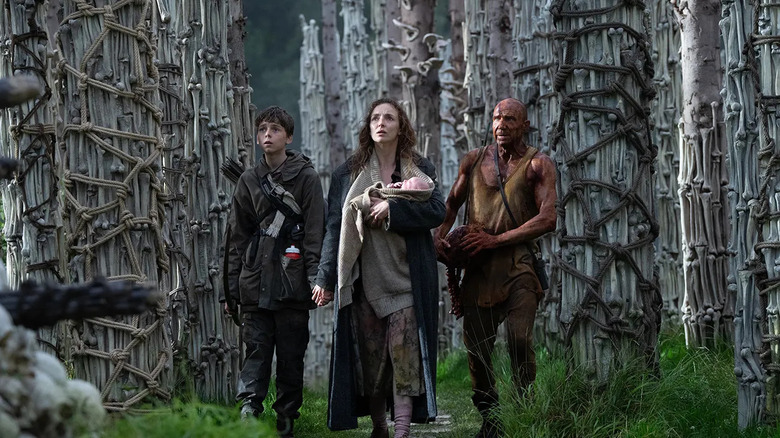This text incorporates spoilers for “28 Years Later.”
As part of the press tour for the discharge of “28 Years Later,” director Danny Boyle was requested by a Tik Tok creator to do a blind rating of his personal favourite 5 movies that he is made. Though the director was being set as much as choose “28 Years Later” for the primary spot, Boyle swerved in a unique course and selected “Tens of millions” as an alternative, the film he made in 2004 in between the one-two horror/sci-fi punch of “28 Days Later” and “Sunshine.” Whereas some commenters on social media discover this selection baffling, it is under no circumstances unusual for an artist to worth a piece of theirs that is typically below seen or underrated. In some instances, that is near-self-promotion, with the artist shining a highlight on one thing they really feel wasn’t given a good shake.
Within the case of Boyle and “Tens of millions,” nonetheless, the filmmaker’s affection for the film feels particularly real, and nowhere is that extra obvious than a viewing of his newest movie. Boyle is an auteur, after all, and thus there are quite a few stylistic tics and thematic threads that join all of his films and make them a part of a cohesive filmography. But whereas “28 Years Later” is a sequel to Boyle’s “28 Days Later” and options components that seem in loads of his different movies, it is “Tens of millions” that the film appears to have probably the most in frequent with. As a result of Boyle’s work on “Tens of millions” is genuinely underrated, the points of it that flip up once more in “28 Years Later” are very welcome. In actual fact, it is these qualities that each films share that helps make “28 Years Later” some of the distinctive and memorable post-apocalyptic horror films ever made.
The non secular underpinnings of Tens of millions and 28 Years Later
Proper from the start of his profession, Danny Boyle proved himself as adept in taking part in round with style conventions as a lot as he manipulates a movie’s tempo and tone. As such, nearly all of his films are both style mash-ups or uniquely uncommon of their method. “Tens of millions” isn’t any exception, for whereas what repute it does have is basically as a candy household movie, its plot is actually rooted in movie noir, and is one thing like Sam Raimi’s “A Easy Plan” (or Boyle’s personal debut, “Shallow Grave”) however with wide-eyed kids as an alternative of jaded adults. Within the movie, a 9-year-old boy named Damian (Alex Etel) and his older brother Anthony (Lewis Owen McGibbon) come throughout a bag full of money cash whereas taking part in close to the prepare tracks of their industrial suburban city. Whereas Anthony tries to plan a means of holding the cash and utilizing it for himself and his household, the religious Catholic Damian begins to offer the cash away in numerous charitable methods. Sadly, one of many thieves who stole the cash within the first place comes again on the lookout for it, placing Damian’s plan of giving in addition to his and his household’s lives in peril.
One of the vital exceptional issues about “Tens of millions” is the way it treats Damian’s Catholicism with respect. In one other film, his insistence on giving the cash away to others or utilizing it for different charitable functions can be scoffed at, and the boy’s religion would probably be belittled within the course of. “Tens of millions” is just not Catholic propaganda, nonetheless — the film depicts Damian’s model of the religion, not that of the establishment’s. Boyle and screenwriter Frank Cottrell-Boyce discover how Damian’s worldview impacts every thing round him, with Boyle inserting cutaways and flights of fancy as additional examples.
The identical could be stated for the characters in “28 Years Later,” as Spike (Alfie Williams) is part of an remoted group on a distant island, who appear to have established an offshoot religion of their very own because the outbreak of the Rage virus in 2002. This religion appears to be extraordinarily conventional (which is to say patriarchal), and places an emphasis on everybody having a job in the neighborhood that they keep on with and take satisfaction in. As per his machismo-filled father, Jamie (Aaron Taylor-Johnson), Spike is meant to be a hunter. The place “Tens of millions” positions Damien’s religion as a optimistic, motivational power, “28 Years Later” calls into query the island’s inflexible beliefs, particularly when a person who lives within the mainland that Jamie and others have deemed a harmful lunatic, Dr. Kelson (Ralph Fiennes), is found by Spike to be a kindly, clever man who’s merely discovered his personal spirituality throughout the post-apocalypse.
Tens of millions and 28 Years Later each discover a boy’s coming of age in a gritty world
At their core, “Tens of millions” and “28 Years Later” are coming of age tales, and although the previous is a little more conventional than the latter, each are deeply and keenly felt. That is as a result of Boyle, Cotrell-Boyce, and “Years” author Alex Garland introduce their younger protagonists to the pitfalls of life with out pulling any punches. Sure, “Tens of millions” sugar-coats these classes a bit bit within the type of Damian’s daydream fantasies and visions of saints, however Boyle can not help however convey an edge to those fairy-tale like trappings; in the best way that the heroin-induced fantasies of Renton (Ewan McGregor) in “Trainspotting” had been sweetly perverse, Damian’s visions in “Tens of millions” are perversely candy. In step with that sense of subversion, one may argue that “Tens of millions” really is not a coming of age film, insofar as Damian does not bear an enormous change through the course of the movie. Whereas he does certainly have an awakening almost about the stolen cash and it inflicting extra hurt than good, his religion is rewarded in the long run, together with his sense of charity seemingly leading to some wells being constructed as a way to assist impoverished communities dwelling in Africa.
The trail from boy to man is far harsher and extra conventional in “28 Years Later,” but it surely’s additionally simply as tenderly touching as “Tens of millions,” making “Years” the uncommon post-apocalyptic zombie movie you’ll be able to have a cathartic cry at. As soon as once more, Boyle’s sense of subversion is at play; the place in one other movie the clearly delicate Spike would reject his father’s insistence at being educated as a killer, Spike comes to know the worth of with the ability to survive in a harsh world of the Contaminated, but nonetheless rejects Jamie (and the village’s) patriarchal, uncaring perspective towards these in want. Given the film’s cliffhanger ending (and a direct follow-up movie to be launched in January of subsequent 12 months), it is extremely probably that Spike’s maturation has solely simply begun. But “Years” feels full sufficient as a way to deem it on par with “Tens of millions” and its life classes.
Essentially the most direct parallel between the 2 movies is that each Damian and Spike need to endure the lack of their moms. For Damian, the precise occasion has occurred offscreen earlier than we meet him, but the boy’s visions of her point out how a lot her loss has affected him and his household. Conversely, Spike should endure the sluggish decline of his mom Isla (Jodie Comer), who is just not dying of the Rage virus however reasonably most cancers. Whereas Boyle fortuitously did not need to endure such incident as a boy himself, he was raised by a religious Catholic mom who wished him to turn out to be a priest, a life which he clearly rejected. This can be the core of Boyle’s fluid tonalities in his movies, notably these two; there are larger powers, and there may be harsh actuality, and the 2 should discover a option to coexist. Within the cinema of Danny Boyle, they definitely do.




